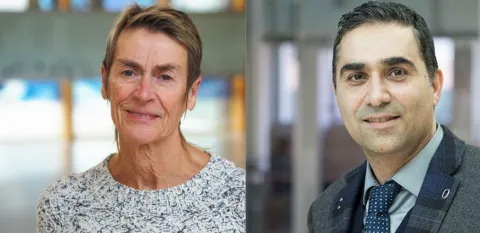Two UBC Applied Science profs inducted into Royal Society of Canada

Leonie Sandercock, a professor in the UBC School of Community and Regional Planning (SCARP), has been elected a fellow of the Royal Society of Canada (RSC), Canada’s highest honour for artists, scholars and scientists.
The co-creator of SCARP’s Indigenous Community Planning program and a former director of the school, Sandercock primarily explores “the uses of film … as a catalyst for Indigenous community development.” She is currently monitoring and evaluating the impact of a film she developed together with the Haida Nation and Inuit-owned Kingulliit Productions — the multi-award-winning Edge of the Knife — on the Haida community.
Abbas Milani, a mechanical engineering professor in the School of Engineering on UBC’s Okanagan campus, has been named a member of the RSC’s College of New Scholars, Artists and Scientists, Canada’s “first national system of multidisciplinary recognition for the emerging generation of Canadian intellectual leadership.”
An expert on composite materials, structures and manufacturing processes, Milani is the principal investigator of the Okanagan node of the Composites Research Network, the Advanced Materials and Fabrication Core Competency Lead of UBC’s Survive and Thrive Applied Research program and director of the Materials and Manufacturing Research Institute at UBC.
Of the 2020 fellows and members, Jeremy McNeil, the RSC president, says, “The Royal Society of Canada is delighted to recognise this year’s exceptional cohort of inductees, as the contributions of these outstanding artists, scholars and scientists have significantly impacted their respective disciplines at both national and international levels.”
Sandercock holds a bachelor’s degree in history from the University of Adelaide, a PhD in urban research from Australian National University and an MFA in screenwriting from the University of California, Los Angeles. Her numerous honours include the UBC Applied Science Dean’s Medal of Distinction and the Distinguished Planning Educator Award from the Association of Collegiate Schools of Planning.
Milani holds bachelor’s and master’s degrees in mechanical engineering from the Iran University of Science and Technology and a PhD in mechanical engineering from McGill University. Among his many awards for research, teaching and service are the 2015 UBC Okanagan Researcher of the Year Award and the Teaching Honour Roll from the Centre for Teaching and Learning at UBC Okanagan.
The induction ceremony for the RSC’s Class of 2020, which will allow the new members to join “from home, from campus, or in Toronto,” is scheduled to take place on Friday, November 27.
Sandercock’s full citation from the RSC reads:
Innovative, visionary and audacious, Leonie Sandercock’s community-based scholarship and practice in the fields of urban planning and community development have engaged some of the most intractable issues of our time—inequality, discrimination, and racism. Through award-winning books and films, she has influenced the planning field to become more culturally-fluent, addressing diversity and difference through structural change, and her partnerships with Indigenous communities model reconciliation in practice.
The RSC citation for Milani reads:
Abbas S. Milani is a leading expert in modeling, simulation, and multicriteria optimization of advanced composite/biocomposite materials and their manufacturing processes. His interdisciplinary work links theoretical concepts to real-world applications, thereby enabling innovations for industry across Canada in manufacturing high-quality and cost-effective products. He is a Killam Laureate and the founding Director of the Materials and Manufacturing Research Institute at UBC. He has authored over 300 publications, including five books.
The RSC consists of three academies (the Academy of the Arts and Humanities, the Academy of Social Sciences and the Academy of Science) and is aimed at recognizing “scholarly, research and artistic excellence” and promoting “learning and research in the arts, the humanities and the natural and social sciences.”
The College of New Scholars, Artists and Scientists, which was established as an entity of the RSC in 2014, identifies and brings together mid-career scholars, artists and scientists who have achieved excellence in their disciplines. It also aims to advance understanding and improve society by promoting “the interaction of diverse intellectual, cultural and social perspectives.”
For more information about the RSC, the newly elected fellows and the incoming class of the College of New Scholars, Artists and Scientists, please see the UBC announcement and the RSC's release.


